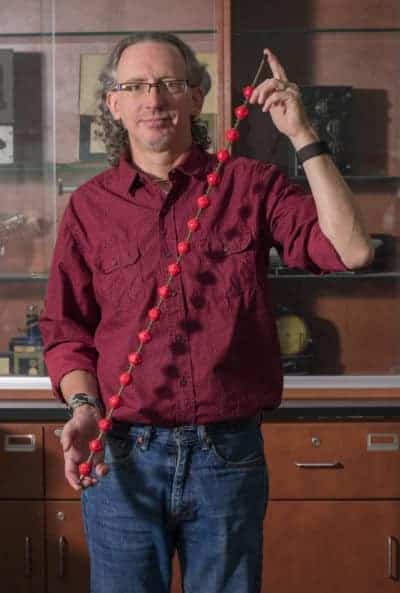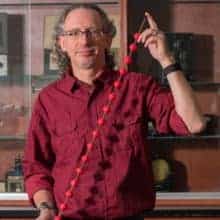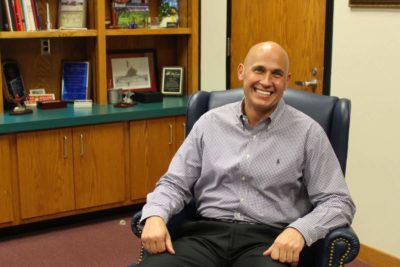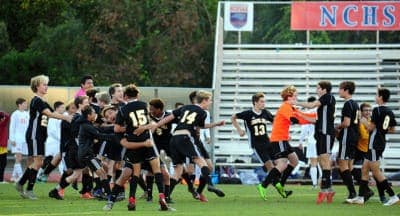At some point in my junior or senior year of my undergraduate studies as an astronomy major at UNC-Chapel Hill, I realized that I probably wanted to teach at the college level. Teaching at a four-year college or university was not my goal and neither was working in the public schools. In between was this world I knew little about at the time: the community college system.
I grew up in a city with a small community college (now called Stanly Community College) and I even took a continuing education astronomy course there, as I recall, during my senior year. I do not know for sure whether or to what extent that influenced me, but I would not be surprised if it somehow did.
After completing graduate school in 1991 with a Master of Science degree in physics from UNC-Greensboro, I spent the next year working in a grocery store while looking for a suitable teaching position. On Monday, August 24, 1992, I reported for my first day of work at Catawba Valley Community College. I remember that particular day well because it was also the day I turned 25.
I was told that at least for a couple of years, and maybe even longer, I was the youngest faculty member here, and that presented some minor problems. Folks who worked in the registrar’s office frequently assumed I was a student and looked puzzled when I asked about enrollment figures for my courses (there were no faculty computers on campus in those days). I recall one person telling me that I should contact the course instructor. They looked surprised when I politely informed them that I was the instructor.
Now, I am in my 27th year here and so much has changed. Every faculty member has a computer. Most classrooms have computers. Every faculty member has an office telephone; they were not permitted in faculty offices in 1992 except for department chairs.


Ironically, when I first began this career, I strongly suspected at the time that I would leave for something else after two or three years. I have quite literally spent half of my biological life here, so I suppose I can say that I love what I do. That helps on those days when I might be convinced otherwise.
In the 1990s, our average student age was in the mid- to upper-20s. The economy tanked, recovered, tanked again, and recovered yet again. Now, the average age is considerably lower, and that presents several issues. As someone who understands the value of a college level liberal arts education (and as a product of such an education), I have concerns about justifying college strictly as preparation for a job or career. A well-organized community college can certainly serve both purposes, but not necessarily for the same population of students. We must be careful to keep the mission of a liberal arts undergraduate education intact for those students who want to choose that path. We need to ensure that a liberal arts education from a community college remains a better value in the choice between us and larger institutions.
Community college faculty in North Carolina need a greater voice in policy issues, and too frequently our concerns are not heard at the state level. We cannot forget that no institution of higher learning can serve students without also serving its faculty. Our four-year college and university colleagues enjoy privileges of representation that we do not have, and indeed cannot have under current state policy. Our system must address this.
There is one particular experience I hope I never forget. There was a student, whose name I cannot recall, in one of my general astronomy classes who said something in class that still nearly moves me to tears every time I think about it. For a bit of background, my astronomy courses are quite different in approach from courses anywhere else. There is no value in simply throwing content at students from day one so I gave up on that approach over a decade ago and moved to a better, research-based approach that emphasizes critical thinking. Among other things, this allows for greater student engagement in their own education. I mean, they are paying for it so they may as well get to meaningfully participate in it, right? Of course.
During a discussion one day, this student offered: “Now I know I’m not stupid…”
I have heard that from many students before, and this was rightly something to celebrate and we did just that (we don’t celebrate these victories enough and that needs to change). But, if you note the pause at the end of that remark, the student said something next that I had never heard before. He continued, “…like my parents have told me all my life.”
The silence in the classroom was deafening. That moment changed me forever. I hear this student’s voice every time I go into the classroom where this took place and look at the chair in which he was sitting at the time. How could anyone hear something like that and not be changed?
I do not know what that student did after finishing that course, but as far as I am concerned he was a new person and that was a major accomplishment in addition to any academic accolades or jobs he may have subsequently achieved. There are days when that student’s voice is all that keeps me going.
While we are on the subject of positive student experiences, it also helps to remember that I have had quite a few students transfer to a four-year institution and major in physics, astronomy, or engineering. I have a former student currently completing a triple major in physics, mathematics, and philosophy and is in the process of applying to prestigious institutions (including Oxford) to earn his Ph.D. in the philosophy of physics. I have a former student currently completing his Ph.D. in nuclear engineering. I have a former student who majored in computer science and is now working as a software engineer with Cisco Systems.
Success is not, and must not be, measured solely by academic credentials. I have another former student preparing to begin graduate work in peace and conflict studies. I have many, many more students who have gone on to complete academic paths in other fields and many who entered the workforce directly after leaving community college. They too are as successful as any other students because they dared to work for it.





